June 30, 2010
Written by C.N.
New Books: Race/Ethnicity in Contemporary America
As part of this blog’s mission of making academic research and data more easily accessible, understandable, and applicable to a wider audience and to practical, everyday social issues, I highlight new sociological books about Asian Americans and other racial/ethnic groups as I hear about them. A book’s inclusion is for informational purposes only and does not necessarily mean a full endorsement of its contents.
It’s been kind of a quiet start of the summer in terms of pressing issues or current events related to race/ethnicity, so perhaps it’s useful to take a step back and look at the general state of race/ethnicity in contemporary American society.
Searching for Whitopia: An Improbable Journey to the Heart of White America, by Rich Benjamin (Hyperion Press)
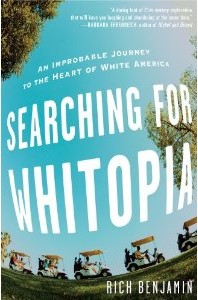
Between 2007 and 2009, Rich Benjamin, a journalist-adventurer, packed his bags and embarked on a 26,909-mile journey throughout the heart of white America, to some of the fastest-growing and whitest locales in our nation.
By 2042, whites will no longer be the American majority. As immigrant populations–largely people of color–increase in cities and suburbs, more and more whites are moving to small towns and exurban areas that are predominately, even extremely, white. Rich Benjamin calls these enclaves “Whitopias” (pronounced: “White-o-pias”).
His journey to unlock the mysteries of Whitopias took him from a three-day white separatist retreat with links to Aryan Nations in North Idaho to the inner sanctum of George W. Bush’s White House–and many points in between. And to learn what makes Whitopias tick, and why and how they are growing, he lived in three of them (in Georgia, Idaho, and Utah) for several months apiece. A compelling raconteur, bon vivant, and scholar, Benjamin reveals what Whitopias are like and explores the urgent social and political implications of this startling phenomenon.
The glow of Barack Obama’s historic election cannot obscure the racial and economic segregation still vexing America. Obama’s presidency has actually raised the stakes in a battle royale between two versions of America: one that is broadly comfortable with diversity yet residentially segregated (ObamaNation) and one that does not mind a little ethnic food or a few mariachi dancers–as long as these trends do not overwhelm a white dominant culture.
Colorblind: The Rise of Post-Racial Politics and the Retreat from Racial Equity, by Tim Wise (City Lights Publishers)
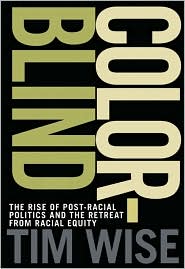
In this powerful follow-up to Between Barack and a Hard Place, Tim Wise argues against “colorblindness†and for a deeper color-consciousness in both public and private practice. We can only begin to move toward authentic social and economic equity through what Wise calls “illuminated individualism”—acknowledging the diverse identities that have shaped our perceptions, and the role that race continues to play in the maintenance of disparities between whites and people of color in the United States today. This is the first book to discuss the pitfalls of “colorblindness†in the Obama era.
Uncommon Common Ground: Race and America’s Future, by Angela Glover Blackwell, Stewart Kwoh, and Manuel Pastor (W.W. Norton & Co.)
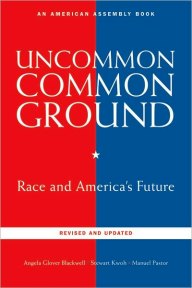
With a mixed-race president, a Latino population that is now the largest minority, and steadily growing Asian and Pacific Islander populations, race is both the most dynamic facet of American identity and the defining point of American disunity.
By broadening the racial dialogue, Blackwell, founder of PolicyLink; Kwoh, president of the Asian Pacific American Legal Center; and Pastor, professor of American Studies and Ethnicity at USC, bring new perspective to this essential American issue.
Doing Race: 21 Essays for the 21st Century, edited by Hazel Rose Markus and Paula M. L. Moya (W.W. Norton & Co.)
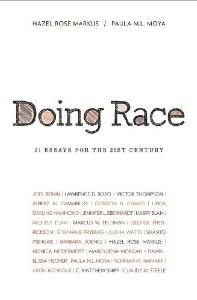
Doing Race focuses on race and ethnicity in everyday life: what they are, how they work, and why they matter. Going to school and work, renting an apartment or buying a house, watching television, voting, listening to music, reading books and newspapers, attending religious services, and going to the doctor are all everyday activities that are influenced by assumptions about who counts, whom to trust, whom to care about, whom to include, and why. Race and ethnicity are powerful precisely because they organize modern society and play a large role in fueling violence around the globe.
Drawing on the latest science and scholarship, the collected essays emphasize that race and ethnicity are not things that people or groups have or are, but rather sets of actions that people do. Doing Race provides compelling evidence that we are not yet in a “post-race†world and that race and ethnicity matter for everyone. Since race and ethnicity are the products of human actions, we can do them differently. Like studying the human genome or the laws of economics, understanding race and ethnicity is a necessary part of a twenty first century education.
Erasing Racism: The Survival of the American Nation, by Molefi Kete Asante (Prometheus Books)
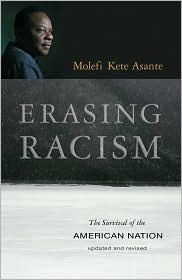
Did the election of Barack Obama as President of the United States signal real progress in bridging America’s long-standing racial divide? In this profound study of systemic racism, Molefi Kete Asante, a leading scholar of African American history and culture, discusses the greatest source of frustration and anger among African Americans in recent decades: what he calls “the wall of ignorance” that attempts to hide the long history of racial injustice from public consciousness.
This is most evident in each race’s differing perspectives on racial matters. Though most whites view racism as a thing of the past, a social problem largely solved by the civil rights movement, blacks continue to experience racism in many areas of social life: encounters with the police; the practice of redlining in housing; difficulties in getting bank loans, mortgages, and insurance policies; and glaring disparities in health care, educational opportunities, unemployment levels, and incarceration rates.
Though such problems are not expressions of the overt racism of legal segregation and lynch mobs – what most whites probably think of when they hear the word ‘racism’ – their negative effect on black Americans is almost as pernicious. Such daily experiences create a lingering feeling of resentment that percolates in a slow boil till some event triggers an outburst of rage. Asante argues that America cannot long continue as a cohesive society under these conditions.
As we embark upon new leadership under America’s first African American president, he urges more public focus on redressing the wrongs of the past and their continuing legacy. Above all, he thinks that Americans must seriously consider some system of reparations to deal with both past and present injustices, an apology, and our own truth-and-reconciliation committee that addresses both the history of slavery and present-day racism. Only in this way, he feels, can we ever hope to heal the racial divide that never seems to be erased.
Author Citation
Copyright © 2001- by C.N. Le. Some rights reserved. 
Suggested reference: Le, C.N. . "New Books: Race/Ethnicity in Contemporary America" Asian-Nation: The Landscape of Asian America. <https://www.asian-nation.org/headlines/2010/06/new-books-race-ethnicity-contemporary-america/> ().
Short URL: https://www.asian-nation.org/headlines/?p=1619
Tags:
Translate Into Another Language![]()
